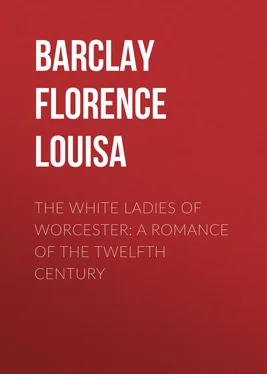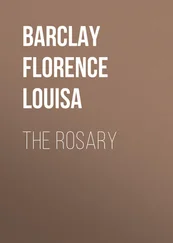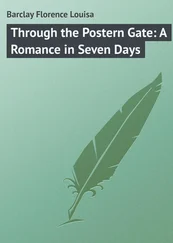Florence Barclay - The White Ladies of Worcester - A Romance of the Twelfth Century
Здесь есть возможность читать онлайн «Florence Barclay - The White Ladies of Worcester - A Romance of the Twelfth Century» — ознакомительный отрывок электронной книги совершенно бесплатно, а после прочтения отрывка купить полную версию. В некоторых случаях можно слушать аудио, скачать через торрент в формате fb2 и присутствует краткое содержание. Жанр: foreign_prose, foreign_antique, на английском языке. Описание произведения, (предисловие) а так же отзывы посетителей доступны на портале библиотеки ЛибКат.
- Название:The White Ladies of Worcester: A Romance of the Twelfth Century
- Автор:
- Жанр:
- Год:неизвестен
- ISBN:нет данных
- Рейтинг книги:3 / 5. Голосов: 1
-
Избранное:Добавить в избранное
- Отзывы:
-
Ваша оценка:
- 60
- 1
- 2
- 3
- 4
- 5
The White Ladies of Worcester: A Romance of the Twelfth Century: краткое содержание, описание и аннотация
Предлагаем к чтению аннотацию, описание, краткое содержание или предисловие (зависит от того, что написал сам автор книги «The White Ladies of Worcester: A Romance of the Twelfth Century»). Если вы не нашли необходимую информацию о книге — напишите в комментариях, мы постараемся отыскать её.
The White Ladies of Worcester: A Romance of the Twelfth Century — читать онлайн ознакомительный отрывок
Ниже представлен текст книги, разбитый по страницам. Система сохранения места последней прочитанной страницы, позволяет с удобством читать онлайн бесплатно книгу «The White Ladies of Worcester: A Romance of the Twelfth Century», без необходимости каждый раз заново искать на чём Вы остановились. Поставьте закладку, и сможете в любой момент перейти на страницу, на которой закончили чтение.
Интервал:
Закладка:
The atmosphere of the empty cell, charged during the past hour with such unaccustomed forces of conflict and of passion, settled into the quietude of an unbroken stillness.
The Madonna smiled serenely upon the Holy Babe. The dead Christ, with bowed head, hung forlorn upon the wooden cross. The ponderous volumes in black and silver bindings, lay undisturbed upon the table; and the Bishop's chair stood empty, with that obtrusive emptiness which, in an empty seat, seems to suggest an unseen presence filling it. The silence was complete.
But presently a queer shuffling sound began in the inner cell, as of something stiff and torpid compelling itself to action.
Then a weird figure, the wizen face distorted by grief and terror, appeared in the doorway—old Mary Antony, holding a meat chopper in her shaking hands, and staring, with chattering gums, into the empty cell.
That faithful soul, although dismissed, had resolved that the adored Reverend Mother should not go forth to meet dangers—ghostly or corporeal—alone and unprotected.
Hastening to the kitchens, she had given instructions that the evening meal was not to be served until the Reverend Mother herself should sound the bell.
Then, catching up a meat chopper, as being the most murderous-looking weapon at hand, and the most likely to strike terror into the ghostly heart of Sister Agatha, old Antony had hastened back to the passage.
Creeping up the stairs, hugging the wall, she had reached the top just in time to see, in the dim distance, the two tall white figures confronting one another.
Clinging to her chopper, motionless with horror, she had watched them, until they began, to come toward her, moving in the direction of the Reverend Mother's cell. They were still thirty yards away, at the cloister end of the passage. Old Antony was close to the open door.
Through it she had scurried, unheard, unseen, a terrified black shadow; yet brave withal; for with her went the meat chopper. Also she might have turned and fled back down the stairs, rather than into the very place whither she knew the Reverend Mother was conducting this tall spectre of the long dead Sister Agatha, grown to most alarming proportions during her fifty years' entombment! But being brave and faithful old Antony had sped into the inner cell, and crouched there in a corner; ready to call for help or strike with her chopper, should need arise.
Thus it came to pass that this old weaver of romances had perforce become a listener to a true romance so thrilling, so soul-stirring, that she had had to thrust the end of the wooden handle of the chopper into her mouth, lest she should applaud the noble Knight, cry counsel in his extremities, or invoke blessings on his enterprise. At each mention of the Ladies Eleanor and Alfrida, she shook her fist, and made signs with her old fingers, as of throttling, in the air. And when the clerkly messenger, arriving to speak with the Lady Alfrida—who, Saint Luke be praised, was by that time dying—found the Knight awaiting him with a noose flung over a strong bough, old Antony had laid down the chopper that she might the better hug herself with silent glee; and when the Knight rode away and left him hanging, she had whispered "Pieman! Pieman!" then clapped her hands over her mouth, rocking to and fro with merriment. When the Knight made mention that they called him "Knight of the Bloody Vest," old Antony had started; then had shaken her finger toward the entrance, as she was used to shake it at the robin, and had opened her wallet to search for crumbs of cheese. But soon again the story held her and, oblivious of the present, she had been back in the realms of romance.
Not until the Knight ceased speaking and the Reverend Mother's sad voice fell upon her ear, had old Antony realised the true bearing of the tale. Thereafter her heart had been torn by grief and terror. When they kneeled together, before the Madonna, with uplifted faces, Mary Antony had crawled forward and peeped. She had seen them kneeling—a noble pair—had seen the Prioress catch at his hand and clasp it; then, crawling back had fallen prostrate, overwhelmed, a huddled heap upon the floor.
The ringing of the Refectory bell had roused her from her stupor in time to hear the impassioned appeal of the Knight, as he kneeled alone before the Virgin's shrine.
Then, the Knight and the Prioress both being gone, Mary Antony had arisen, lifted her chopper with hands that trembled, and now stood with distraught mien, surveying the empty cell.
At length it dawned upon her that she and her weapon were locked into the Reverend Mother's cell; she, who had been most explicitly bidden to go to the kitchens and to remain there. It had been a sense of the enormity of her offence in having disobeyed the Reverend Mother's orders which, unconsciously, had caused her to stifle all ejaculations and move without noise, lest she should be discovered.
Yet now her first care was not for her own predicament, but for the two noble hearts, of whose tragic grief she had secretly been a witness.
Her eye fell on the Madonna, calmly smiling.
She tottered forward, kneeling where the Prioress had knelt.
"Holy Mother of God," she whispered, "teach him that she cannot do this thing!"
Then, moving along on her knees to where the Knight had kneeled: "Blessèd Virgin!" she cried, "shew her that she cannot leave him desolate!"
Then shuffling back to the centre, and kneeling between the two places:
"Sweetest Lady," she said, "be pleased to sharpen the old wits of Mary Antony."
Looking furtively at the Madonna, she saw that our Lady smiled. The blessèd Infant, also, looked merry. Mary Antony chuckled, and took heart. When the Reverend Mother smiled, she always knew herself forgiven.
Moreover, without delay, her request was granted; for scarcely had she arisen from her knees, when she remembered the place where the Reverend Mother kept the key of her cell; and she, having locked the door, on leaving, with her own master-key, the other was quickly in old Antony's hand, and she out once more in the passage, locking the door behind her; sure of being able to restore the key to its place, before it should be missed by the Reverend Mother.
Sister Mary Antony slipped unseen past the Refectory and into the kitchens. Once there, she fussed and scolded and made her presence felt, implying that she had been waiting, a good hour gone, for the thing for which she had but that moment asked.
The younger lay-sisters might make no retort; but Sister Mary Martha presently asked: "What have you been doing since Vespers, Sister Antony?"
By aid of the wits our Lady had sharpened, old Antony, at that moment, realised that sometimes, when you needs must deceive, there is nothing so deceptive as the actual truth.
"Listening to a wondrous romantic tale," she made answer, "told by the Knight of the Bloody Vest."
"You verily are foolish about that robin, Sister Antony," remarked Mary Martha; "and you will take your death of cold, sitting out in the garden in the damp, after sunset."
"Well—so long as I take only that which is mine own, others have no cause to grumble," snapped Mary Antony, and turned her mind upon the making of a savoury broth, favoured by the Reverend Mother.
And all the while the Devil was whispering in the old woman's ear: "She will not return. . . . Make thy broth, fool; but she will not be here to drink it. . . . The World and the Flesh have called; the Reverend Mother will not come back. . . . Stir the broth well, but flavour it to thine own taste. Thou wilt sup on it thyself this night. When the World and the Flesh call loudly enough, the best of women go to the Devil."
"Liar!" said Mary Antony, brandishing her wooden spoon. "Get thee behind me—nay, rather, get thee in front of me! I have had thee skulking behind me long enough. Also in front of me, just now, being into the fire, thou wilt feel at home, Master Devil! Only, put not thy tail into the Reverend Mother's broth."
Читать дальшеИнтервал:
Закладка:
Похожие книги на «The White Ladies of Worcester: A Romance of the Twelfth Century»
Представляем Вашему вниманию похожие книги на «The White Ladies of Worcester: A Romance of the Twelfth Century» списком для выбора. Мы отобрали схожую по названию и смыслу литературу в надежде предоставить читателям больше вариантов отыскать новые, интересные, ещё непрочитанные произведения.
Обсуждение, отзывы о книге «The White Ladies of Worcester: A Romance of the Twelfth Century» и просто собственные мнения читателей. Оставьте ваши комментарии, напишите, что Вы думаете о произведении, его смысле или главных героях. Укажите что конкретно понравилось, а что нет, и почему Вы так считаете.












